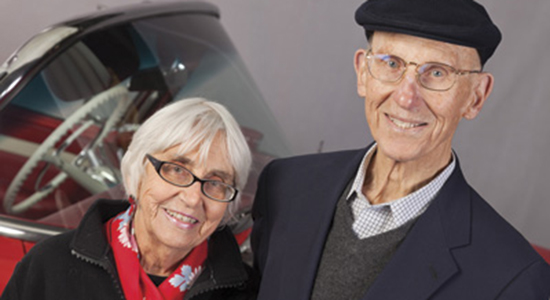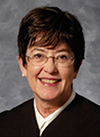
Margo and Joe Melli shared their “retirement” stories in “Retire Your Way: Shifting Gears” (Wisconsin Lawyer, May
2011). Despite graduating top of her class in 1949, Margo had difficulty getting hired by law firms. Undaunted, she
helped reform Wisconsin’s child support system, reorganized the state court’s system, and eventually became the
first female tenure-track professor in the U.W. Law School’s history. She passed on Jan.6, 2018. Photo: Andy Manis
Margo Melli was an icon for generations of women who attended the U.W. Law School or practiced law in Wisconsin. She helped us see our possibilities as lawyers, as women, and as mothers when there were precious few such examples to inspire us. How Margo reached that pinnacle is an amazing story, which I had the privilege of hearing when I interviewed Margo in 2005 for the American Bar Association oral history, “Women Trailblazers in the Law.”
Margo was born in 1926, just before the Great Depression. Her family was initially in Mississippi, where her first school experience was totally segregated. Her family returned to Madison in search of work when Margo was starting second grade. She finished grade school and high school in Madison.
 Hon. Joan F. Kessler, Marquette 1968, is a judge on the Wisconsin Court of Appeals for District 1, Milwaukee.
Hon. Joan F. Kessler, Marquette 1968, is a judge on the Wisconsin Court of Appeals for District 1, Milwaukee.
It is an understatement to say that Margo was very smart. She finished her undergraduate degree in international relations at U.W.-Madison while attending her first year at the U.W. Law School. She started law school in 1947 and finished in 1949. As she described it, she graduated “with honors, and Phi Beta Kappa and those kinds of things.”
Finding a job as a lawyer turned out to be more problematic for a woman than becoming a lawyer. Despite her excellent record, Margo was not selected by the dean (who controlled who interviewed) to interview with the law firms that came to campus. The dean later told her the firms wouldn’t hire a woman and he didn’t want to waste their time.
Margo was not deterred. Public service became her career, although I doubt she had planned it that way. Her first job as a lawyer was with the Wisconsin Legislative Council, which hired her to codify Wisconsin’s criminal law. This took two years to complete. Then she was assigned to revise the Children’s Code. In both instances, the legislature adopted her work product.
Her second job was the result of a grant a law school professor obtained to develop a code for land-use control and subdivisions. This was important work soon after World War II as veterans were returning to the United States and subdivisions were sprouting like dandelions. Margo helped develop the code and successfully promote its adoption by the legislature.
Finding a job as a lawyer turned out to be more problematic for a woman than becoming a lawyer.
Margo’s work attracted the attention of the newly established Judicial Council, which hired her as its first executive director in 1955. Her work there included guiding collaboration with the Wisconsin Supreme Court to establish rules of civil procedure, and to reorganize the then hodge-podge of courts throughout Wisconsin. Again, her work resulted in new statutes being adopted.
Meet Our Contributors
Why do you do what you do? What's the best advice you ever received? Share your weirdest courtroom story...
Lawyers have a lot to say. Our authors are no exception. Whether its personal, insightful, or fun, it’s always interesting.
Check out our Q&A with the author below
By 1959, when Margo joined the U.W. Law School as an assistant professor, she had been highly instrumental in developing a criminal code, a juvenile code, a land-use code regarding subdivisions, and a Wisconsin civil procedure code, not to mention reorganizing Wisconsin courts. She would have been amazing if she had stopped there. But to the good fortune of many, she didn’t slow down.
As an assistant professor of law, and the only woman on the faculty, Margo initially “taught through the curriculum” before concluding that her main interest was law that affected families. She developed the law curriculum, and taught courses, involving divorce, parent-child relations, and juvenile justice administration. Around 1970 she added an elder law curriculum. During her career, Margo served as chair of the U.W. Faculty Committee (which later became the Faculty Senate), was the first woman to gain tenure while a part-time faculty member (which she remained until her retirement), and became the first such faculty member to be named the prestigious Voss-Bascom Professor Emerita.
As a member of the prestigious American Law Institute, she was selected as the reporter for the institute’s project “The Principles of Family Dissolution,” which presciently dealt with both formal marriages and cohabiting couples. As the first woman to be a Fellow of the American Academy of Matrimonial Lawyers (AAML), she started the AAML Journal, a high-quality law review, still published, devoted to family law topics.
Margo … had been highly instrumental in developing a criminal code, a juvenile code, a land-use code regarding subdivisions, and a Wisconsin civil procedure code, not to mention reorganizing Wisconsin courts.
From 1964 to 1967, she served on the Wisconsin Board of Public Welfare, a policy-setting body that dealt with corrections, mental health, and child welfare. During that time, Margo said, significant legislation was adopted for child welfare programs.
As part of the Board of Attorneys’ Professional Competence (which eventually evolved into today’s Board of Bar Examiners), Margo helped set up the continuing education requirements and enforcement system for lawyers. She became the first woman on the board of trustees of the National Conference of Bar Examiners and by 1990 was the chair. This entity developed the multistate bar examination, taken now by nearly all law school graduates.
Margo’s State Bar activities included serving as chair of the Family Law Section and contributing a quarterly review of Wisconsin family law cases to the Wisconsin Journal of Family Law. She received the Belle Case LaFollette Award from the Wisconsin Law Foundation, for outstanding service to the profession, and was recognized by the State Bar for lifelong contributions to the advancement of women in the legal profession and by the Family Law Section for outstanding service to the section.
Did I mention that while Margo was doing all this, she and her husband, the late Joseph Melli, became the parents of four children? When the children were young, alternative child care was almost impossible to find. The combination of Margo’s personal and professional accomplishments let women law students see, in real life, the possibilities that were opening to women who wanted to be both lawyers and mothers. She inspired us by just being herself. She showed us that intellect and determination could open doors and were not incompatible with having a family. She counseled and encouraged many of us.
Margo Melli’s greatest gift to us was her example, which produced in us courage to reach beyond the generally expected and to find the best that we could be.
Meet Our Contributors
What do you know now about being a judge that you wish you’d known when you were just starting out?
 I started law school after Margo Melli had blazed something of a trail for women. I have been very fortunate over my legal career to participate in nearly all aspects of the legal profession – from law clerk to U.S. District Court judge (appointed by former Wisconsin Gov. John W. Reynolds), to solo private practice, then with a general-practice firm of approximately one dozen lawyers.
I started law school after Margo Melli had blazed something of a trail for women. I have been very fortunate over my legal career to participate in nearly all aspects of the legal profession – from law clerk to U.S. District Court judge (appointed by former Wisconsin Gov. John W. Reynolds), to solo private practice, then with a general-practice firm of approximately one dozen lawyers.
When Jimmy Carter was elected President, I was one of the first four women ever to be appointed as a U.S. Attorney; it was an exciting and demanding time for me, especially with two young children. When Carter lost his reelection bid, I moved to Foley & Lardner, where I remained as a partner for a little more than 20 years.
In all these experiences (with the exception of the law clerk experience), I was seeing the law from a position "in the trenches." My job was to use the law to try to solve a problem for a client. That view changed dramatically when I was elected to the Wisconsin Court of Appeals.
My perspective on the law now is the challenge of learning areas of the law with which I may have had no significant knowledge previously. Cases before the court of appeals present the perpetual challenge to grow intellectually in order to fairly resolve disputes about the meaning of the law.
When I started law school, I never imagined how many exciting experiences I would have because of a law degree. I have been very fortunate.
Hon. Joan F. Kessler, Wisconsin Court of Appeals District 1, Milwaukee.
Become a contributor! Are you working on an interesting case? Have a practice tip to share? There are several ways to contribute to Wisconsin Lawyer. To discuss a topic idea, contact Managing Editor Karlé Lester at (800) 444-9404, ext. 6127, or email klester@wisbar.org. Check out our writing and submission guidelines.
